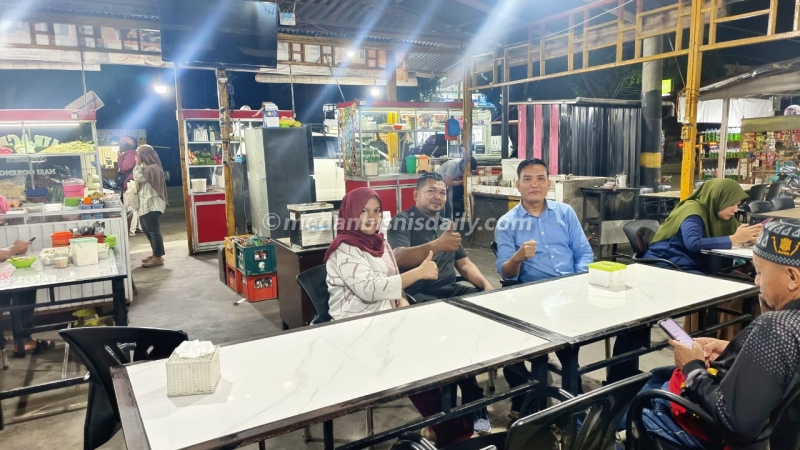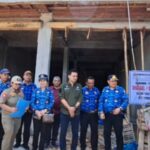The distinct flavor of Aceh-style noodles is increasingly popular among residents of Serdang Bedagai (Sergai) Regency, North Sumatra. One of the most popular spots is Mie Aceh Syedara, owned by a native of Sigli, Aceh.
This culinary business was first established on the Trans-Sumatra Highway in Kota Galo Village, Perbaungan District in 2015, before eventually moving to a location in front of a gas station in Firdaus Village, Sei Rampah District.
By using a recipe with authentic Aceh spices, the owner now achieves a monthly revenue of millions and employs 8 workers. However, he admits that income is not always stable.
“During harvest season, earnings increase quite a bit, but day-to-day it doesn’t always match the costs we imagine,” he said.
The spices for the Aceh noodles are regularly purchased from traditional markets at a cost of around Rp 2.5 million each month.
The menu offered is quite diverse, ranging from fried Aceh noodles, wet noodles, to stir-fried noodles with various topping options such as chicken, beef, shrimp, and squid.
In addition, fried rice, egg martabak, roti cane, smashed fried chicken, various dimsum, and fresh drinks are available. Menu prices are affordable, starting from Rp 5,000 to Rp 30,000 per serving.
One customer expressed being impressed with the flavor of the Aceh noodles served.
“The noodles have a distinctive spice flavor, and the price is affordable for all kinds of people,” he said.
In managing the business, the owner is assisted by his wife, who also handles sales of smashed fried chicken and wonton noodles. Open from 12:00 PM to 3:00 AM.
The presence of this Aceh-style cuisine further enriches the culinary choices for Sergai residents with authentic Indonesian flavors.
Serdang Bedagai (Sergai) Regency
Serdang Bedagai is a regency in the North Sumatra province of Indonesia, established in 2003 from the division of the former Deli Serdang Regency. Historically, its name is derived from the ancient Sultanates of Serdang and Bedagai, which were significant Malay kingdoms in the region. The area is known for its agricultural production, particularly palm oil and rubber, and features a coastal landscape along the Strait of Malacca.
North Sumatra
North Sumatra is a province on the Indonesian island of Sumatra, renowned for its natural beauty and diverse cultures, including the Batak people. Its history is deeply tied to several powerful kingdoms, most notably the Srivijaya and later the Sultanate of Deli. The region is most famous for being home to Lake Toba, the largest volcanic lake in the world, which was formed by a massive supervolcanic eruption approximately 74,000 years ago.
Mie Aceh Syedara
I am unable to find any verifiable information on a place or cultural site named “Mie Aceh Syedara.” It is possible this refers to a specific local restaurant or a misspelling. For accurate information, please verify the correct name of the place you are inquiring about.
Sigli
Sigli is a coastal town in Indonesia’s Aceh province, historically known as an important port and trading center during the Aceh Sultanate. It served as a significant hub for the pepper trade and was a key point for the spread of Islam in the region. Today, it is the capital of the Pidie Regency and remains a local center for commerce and government.
Aceh
Aceh is a province on the northern tip of Sumatra, Indonesia, historically renowned as a powerful and independent Islamic sultanate and a key center for the spread of Islam in Southeast Asia. It is also known for its long resistance against Dutch colonial rule in the Aceh War, which lasted from 1873 to 1904. Today, the region is recognized for its distinct cultural identity and for being the area most severely impacted by the 2004 Indian Ocean earthquake and tsunami.
Trans-Sumatra Highway
The Trans-Sumatra Highway is a major road network spanning the length of Indonesia’s Sumatra island, conceived to boost economic development and connectivity. Its construction began in the late 20th century, with ongoing efforts to upgrade and expand it to improve logistics and access across the island’s diverse and often challenging terrain.
Kota Galo Village
Kota Galo is a traditional village located in the Belu Regency of East Nusa Tenggara, Indonesia. It is known for its well-preserved traditional houses (ume kbubu) and its unique cultural heritage, which reflects the ancient customs of the local Tetun people. The village serves as an important site for maintaining and showcasing the region’s indigenous architecture and social traditions.
Perbaungan District
Perbaungan is a district in North Sumatra, Indonesia, historically known as a significant trade and transit hub during the era of the Deli Sultanate. Today, it functions primarily as an administrative and economic center for the surrounding agricultural region, which is a major producer of palm oil and rubber.






